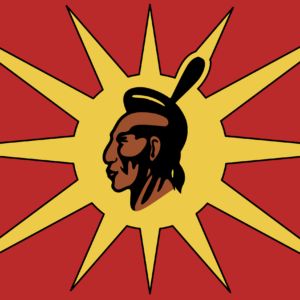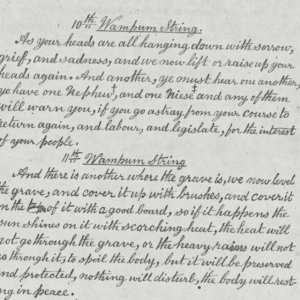We have rather big goals with this newspaper project. As our title would suggest, we are producing a mass circulation newspaper for all people who respect and seek to live by the Two Row Wampum in the territory covered by the Dish with One Spoon treaty. By 2015, we intend to be distributing 100,000 copies of our paper throughout this territory every week.
The Dish with One Spoon agreement was a peace treaty made between the League of Five Nations (and the nations allied to it) and a confederacy of Anishinabek and allied nations in the aftermath of decades of inter-Onkwehon:we strife in the 17th and 18th centuries. It covers a huge territory surrounding the Great Lakes region and encompasses much of Ontario, New York State, Ohio, Michigan and Wisconsin.
The treaty was commemorated in a wampum belt consisting of a white background with a symbol of a rounded dish in the centre of the belt. In 1888, Sganawadih (John Buck) of Six Nations interpreted this belt to mean: “This represents all the Onkwehon:we (translated as original people or sometimes complete person, pronounced oh-gwey-ho-way) on the continent. They have entered into one great league and contract that they will be all one and have one heart. The spot in the centre is a dish of beaver, indicating that they will have one dish and what belongs to one will belong to all.” (cited in Beauchamp I90I: 416).
 The concept behind the Dish with One Spoon stretch back to the origins of the Haudenosaunee Confederacy and the Great Peace itself. As Joyce Tekahnawiiaks King wrote,
The concept behind the Dish with One Spoon stretch back to the origins of the Haudenosaunee Confederacy and the Great Peace itself. As Joyce Tekahnawiiaks King wrote,
“The Peacemaker demonstrated the One Dish/One Spoon principle in an analogy to the fifty Haudenosaunee Roianeson (translated in the English equivalent as chiefs, pronounced low-yaw-neh-soo). Once the Five Nations agreed to unite, the Roianeson sat in a circle to listen to the Peacemaker. The Peacemaker expressed this principle by passing around a bowl of beaver tail, a delicacy among the People of the Longhouse. As the leaders sat in this circle of fifty, the Roianeson took only what they needed, knowing the bowl had to complete its circle. The One Dish demonstrated the collective responsibility of the people to share equally. The spoon revealed an additional symbol lesson here: to avoid a sharp instrument, such as a knife, at a gathering of the people, because knives could cause the spilling of blood. Therefore employing sharp instruments or even sharp words was prohibited.”
Today, 200 years after the great Shawnee leader Tecumseh sought to unite all Onkwehon:we peoples under the principles of the Dish with One Spoon during the conflict known to non-Natives as the War of 1812, it is clear that concepts of the Dish with one Spoon are as needed as ever.
That is the motivation of our paper. To provide a broad-based mass voice to Onkwehon:we people and our allies in the area covered by the Dish with One Spoon territory.
However, we know that we need your help. In launching our publication we are taking a leap of faith, and are following our vision to do what we know must be done. If you like what we are trying to do with this paper, and if you can tolerate the inevitable mistakes and the inadequacies of our efforts, we ask that you join with us and to lend a hand.
That could be as easy as taking a few bundles of the paper every week to distribute them in your neighborhood or area. Or it could mean writing a short article or report about an issue near and dear to your heart. You can also help by advertising with our paper or by supporting the people who do. Please like and share our news and information on Facebook, and write letters to the editor expressing your thoughts and feelings about the issues that matter most to you.
Above all, be proactive and generous. We are striving to make our paper an exemplary instance of the Onkwehon:we resurgence which is currently upon us. We are under no illusion as to the difficulty of this undertaking, but we welcome all the love, support and help you can provide. We will reciprocate.







All [ NON NATIVE AMERICANS ] should honor our treaties with them, we have been here a lot longer then the other people from Europe.
There is a saying and it goes like this; [ if you do not like it here in this great country, then leave. ]